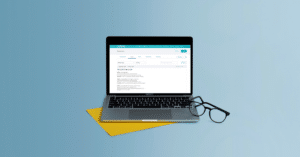Listen on Apple Podcasts Listen on Spotify
Paperwork System for SLPs
In this episode of The SLP Now Podcast, Marisha delves into the often-dreaded subject of paperwork. As a self-proclaimed organization enthusiast, she’s excited to share her insights, tips, and resources with you.
Time Management Magic: Marisha emphasizes the importance of managing your time effectively when dealing with the ever-growing pile of paperwork. She suggests creating a spreadsheet to sort caseload information by IEP due dates. This helps visualize workload patterns and plan accordingly. By setting realistic monthly goals and being strategic with scheduling, you can prevent feeling overwhelmed.
Tame the Paperwork Beast: To tackle the paperwork beast, Marisha recommends using a checklist to ensure you don’t miss any crucial details. Additionally, she discusses the value of a hanging file organizer. Each student gets a designated pocket for all relevant documents, with the checklist placed upfront, creating a streamlined process for managing paperwork.
Be a Time-Saving Pro: In this segment, Marisha shares time-saving strategies. Building templates for repetitive IEP and evaluation sections can significantly speed up the process. To take it further, she introduces the concept of a text expander tool, which allows you to input shortcuts that expand into complete sections, complete with placeholders. Lastly, Marisha highlights the “find and replace” tool, an invaluable resource to ensure accuracy in your paperwork.
Marisha’s three-pronged approach to paperwork—time management, organization, and time-saving tools—can revolutionize your workflow. 💫
Links Mentioned:
How to Manage Your Paperwork
Editable Checklists for SLPs (FREE instant download!)
Hanging Organizer (Amazon link)
Tools: Text Expander + Find and Replace
Subscribe
Subscribe to the SLP Now podcast and stay tuned for our next series. We’re kicking off September by helping you get your data collection, paperwork, and therapy planning processes in tip-top shape! 💪
Listen to The SLP Now Podcast on Apple ★ Spotify ★ Google ★ Stitcher ★ Castbox or wherever you listen to podcasts.
Transcript
Marisha Mets:
Hello there and welcome to the SLP Now podcast where we share practical therapy tips and ideas for busy speech language pathologists. Grab your favorite beverage and sit back as we dive into this week's episode,
Welcome back and I am really looking forward to chatting about paperwork with you today. I am a major systems organization nerd, and I absolutely love talking about this. So thanks for joining me, and I hope you walk away with some helpful tips and resources.
So I am going to cover three tips and resources that you can use to streamline your paperwork. And the first tip is just to organize your time and set yourself up for success in managing all of the paperwork that's on your plate. So how I like to do this is I like to map out my due dates for my IEPs and evaluations. And of course this is going to shift. We'll have students transfer in, we'll need to expedite evaluations. There's a number of things that will change, but it's really helpful to get a rough estimate of what we have coming up.
So what I do is I have a spreadsheet with all of my caseload information, and I will sort by the IEP due date. So I'll sort my information and then I will be able to see how many IEPs I have due in the upcoming months. And you might want to just grab a sheet just so you have a quick reference that you can look at. But let's say I have 8 IEPs due in August, 7 in September, and 10 in October. And then you would just jot down how many you have in each of the months of the school year, and then you can do the same for your evaluations.
But this is really helpful for a number of reasons because I know that I have roughly the same amount of IEPs due every month, but I have more due in October. I've 10 in October and then only 8 and 7 in the previous months. So I know that October is going to be a little bit of a heavier month, and so I might try and front load my work a little bit so that October doesn't have to feel that much heavier compared to the other months. And you might have a bigger discrepancy than just two or three between each month.
But what I would do, maybe just by the quarter, you can add up all of those numbers. So 8 plus 7 plus 10 is 25, if I'm doing my math right, my mental math. And then I would do 25 divided by 3, and then that's roughly, it's 8 point something. So maybe my goal would be, I'll just set a goal to finish 9 IEPs every month.
And then I think this is helpful just to time yourself on the first handful of IEPs that you do, just to get a rough estimate of how long it actually takes you. And so I would go ahead and figure out how many IEPs I need to get done in a given month, how many evaluations, how long each of those things takes me, and then I just want to make sure that I have time to get those things done. So I would look at my schedule and see if it takes me an hour to do each IEP and I'm trying to get 9 done in a month, which is roughly 2 a week, do I have two hours of paperwork time in a week to get those done? If I don't, I will make a plan to make sure that that is doable so that I set realistic expectations for myself. And I just might need to get a little bit strategic with how I navigate my scheduling and all of that.
And sometimes it might mean if there's absolutely no wiggle room in your schedule, I'm a strong, strong advocate for getting work done during the school day. Absolutely do everything that you can to maximize the time that you have there. But sometimes we are just at a spot where for whatever reason, that's not doable. And so I will just think ahead and it's like, "Okay, what would I prefer to do? Would I prefer to catch up on paperwork on a Sunday night or do I want to be proactive and maybe just come to school 30 minutes early, two days a week, or whatever it looks like to just get to knock that out and make sure that I am keeping up with my paperwork?"
So that is tip one, is just to map out your due dates and make sure that you have a way to actually keep up with the paperwork demands. And that can involve speaking with administrators or making changes to your schedule, whatever that might look like.
Then tip two is to use an organizer to manage the process and to manage your papers. So this is a two for one. So I have a checklist that I really like to use. If you check out the show notes for this episode, it'll be slpnow.com/160. Again, that's slpnow.com/160. I'll include a link to a little template that you can use. But I built out a checklist for my IEPs, and I did this with a couple of speech therapists in my district just to make sure that none of us were missing anything. It does take a little bit of time to build out that process, but I just made a checklist with all of the things that I need to do for an IEP to be considered complete and the same for an evaluation.
And so I just write those things down. Then I print off the checklist and I laminated it so that I could use wet erase markers and then check things off as I completed them. And then when I finished an IEP, I would just wet a Kleenex and reuse the laminated sheet for the next IEP. But I would keep this in front with the sack of papers, all the pending paperwork for that IEP. And every time I work on an IEP, I have the checklist and I can just cross off the next step on the list.
Then the other tip to organize those papers, so the checklist is a nice way to manage the process, and then I really like using a hanging file organizer to keep the papers organized, all of the physical papers. So the organizer that I like, I believe it has 7 pockets, which I try to not have that many IEPs pending at any time if I can help it. So I use the hanging file organizer. And you can check out the show notes again, slpnow.com/160 to see what that looks like.
But it has seven pockets in it, and each IEP that I'm working on gets a pocket. So I put all the relevant papers, like any parent report, teacher report, any work samples, any data sheets or whatever papers I might have. I keep them in that folder. And then I keep the checklist at the front of that folder. And so when I'm sitting down to work, when I have my paperwork block, I'll pull out the first file in the organizer, because that's the one that's coming due soonest. And so I'll pull that out, look at the checklist and see what I need to do next. And I will just knock out as many items as I can, and check them off as I go through, which is super, super satisfying. I don't know about you, but I love checking things off.
So I'll go through, check off as many things as I can, and if I still have time in my paperwork block, but I am stuck on some steps, like I'm not able to complete some of the checklist just yet because I'm waiting on information or whatever it might be, then I just put that folder back, grab the next folder, start checking off as many of the items as I can, and then just kind of rinse and repeat. As long as I have paperwork time or if my time is up, then I just put things away. And so that's how, tip two of just keeping things organized.
And then tip three is to use time-saving tools. So I won't go into a ton of detail on the techy-ness of this, but a couple of things that you can do, because in step one we mentioned mapping out your due dates and making sure that you have enough time to actually get the paperwork done. But one kind of solution I mentioned, potentially coming into work a little bit early, or figuring out if you're not able to get things done during the school year or school day, navigating that scheduling. Or a better option is to find a way to get these things done more quickly.
I have just a couple time saving tips that we can consider. And again, anything that I share, it's just a buffet of options. You get to choose what makes the most sense. So one strategy that's really, really helpful is to start building templates. When we write IEPs, there are a lot of things that we write over and over and over and over. Every time we write an IEP, we write a very similar variation of the same thing, for some of the elements. So instead of reinventing the wheel every single time, what if we had templates for those common phrases or the common things that we write?
So when I started doing this, I just went, as a CF I had no idea what to write in an IEP. So I asked my mentor for some examples of reports, and I went through her reports and looked for examples of terminology. And this was really helpful for me because I didn't know what to write. But even for a more seasoned SLP, it's nice to figure out, okay, what does my ideal IEP look like? What would I write? What details would I include? And then making a template for that. So you would just list the different sections of the IEP and then copy and paste examples of texts that you think are really good. And then anytime you're writing an IEP, you can go back to that template and copy and paste, and of course adjust it for the student.
So that's my first time saver that you can use. And this can be really fun to do with a group of SLPs and you can brainstorm, and collaborate, and write really awesome IEPs together. So I started by building out those templates. It was awesome, but there's a lot of components to an IEP, and there's a lot of potential options. And my documents started to get really, really long. And it started to take me longer to find the thing that I wanted to copy and paste than it would have to actually write out the statement. So we want to make sure that the templates that we're creating are really easy to use and find.
So a tool that I really love is a text expander. So if you check out the show notes, slpnow.com/160, you can see there's a link to a post that goes into more detail on the text expander. But basically, I plug in all of my templates into this software and I make shortcuts for all of them. So if I administer the tills, I can make a shortcut for the tills. So it might just be ".tills". And when I type that into my IEP software, it expands into the whole summary of the tills/ and it has all of the placeholders for all of the things/ and examples of analysis, all of that. And then I can just go through and edit all of the placeholders and make it appropriate for that particular student. But a lot of that initial thinking and outline is laid out for me. And then I can use all of my brain space to write an awesome IEP that is super customized for that student.
And then the third resource that can save you some time is the find and replace tool. So if you type command F or control F on your computer, then that launches the find feature. And so in my little templates, I would have placeholders for the student's name and for pronouns. And so I can go through. So I usually use three asterisks for the student's name. So I do command F or control F, depending if you're on a Mac or a PC, then I would type in three asterisks, and then I would search for all of the asterisk.
And then you can use the replace feature to replace those asterisks with the student's names. And then you can go ahead and do search for the two asterisks and replace all of the asterisks with the student's pronoun. Because that's one of the pitfalls of using templates, is that if you have the wrong student's name, or the wrong pronouns, or there's just nothing worse than having that in your paperwork. So this makes it so that you don't have that mistake and then you don't have to worry about that as much when you're doing your editing, and proofing, and all of that.
So just to recap, the three strategies is to map out your due dates and block off your time to make sure that your paperwork goals are reasonable, and doable, and set yourself up for success. Two is to use organization tools to manage the process in the form of checklists and file organizers. And then the third tip is to use time-saving tools like templates, text expanders, and the find and replace tool. And so those are our three paperwork tips. Head to slpnow.com/160 to check out all of the related resources. And I can't wait to see you next week.
Thanks for listening to the SLP Now podcast. If you enjoyed this episode, please share with your SLP friends and don't forget to subscribe to the podcast to get the latest episode sent directly to you. See you next time.
Sign up to receive email updates
Enter your name and email address below and I'll send you periodic updates about the podcast.




Reader Interactions